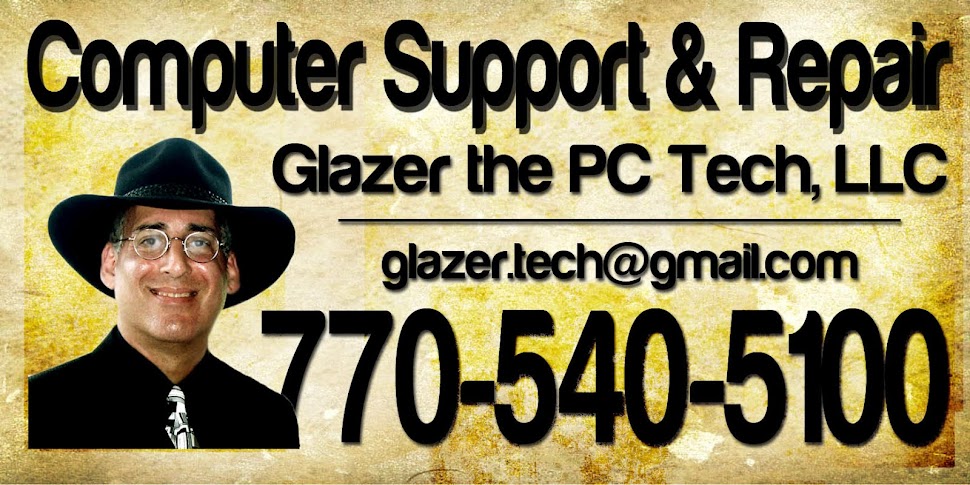
Computer Care: It may be time to ditch your old programs
By Arthur Glazer
glazer.tech@gmail.com
POSTED: July 8, 2011 11:32 p.m
The last time we talked, I gave you some ideas on how to improve your computer system.
Given the constraints of this page, I had more to say than I had room to write. So where did that leave us?
Internet, RAM and back-ups are all covered, which brings us to programs. Most of us have too many of them installed.
If your computer came with WordPerfect and you now have Office or your kids are grown and you still have Toy Story Pinball, it's time for some housekeeping.
It's even more important if your computer is older. Older PCs came with only 40-60GB hard drives, which were considered large enough back then. We know better now.
Delete what you no longer need. Throw out the old; make room for the new.
Use Add/Remove Programs (XP) or Programs & Features (Vista/Win 7) all in Control Panel and then a registry cleaner. When the registry looks for that Disney game that's no longer there, it slows down the system.
Better yet, use Your Uninstaller ($39) or the free Revo Uninstaller, which both scour and optimize the registry after an uninstallation.
By no means just delete program icons from your desktop, because that's all it does - deletes the icons. The programs remain. They need to be uninstalled.
But that said, check your desktop for stray icons. Some you won't need; others can be stored in a folder.
To keep the desktop tidy, keep photos in the Pictures folder in (My) Documents, music in the Music folder and extraneous text files in the Docs folder.
Toss the trials to AOL or Office Student & Teacher if you never installed them.
You can right-click the desktop and choose "New," then "Folder." Call it what you want and store your stuff in it. How about one named Games, one for text, doc and pdf files called Text and another for Misc Stuff. You get the idea.
Try right-clicking on your desktop again and choose "Sort by ..." for options on organizing your icons. As long as "Auto arrange" is unchecked, you can drag them to wherever you desire.
If you have inadvertently deleted something and haven't rebooted the system yet, double-click on the Recycle Bin. Find the item in question and click on it, then click "Restore." Alternatively, right-click the item, then choose "Restore." It will revert to its original location.
Another right-click to your desktop (XP) will yield a choice to change the desktop image. Choose "Properties" and then the Desktop tab. Scroll through the list and choose your favorite. Click "Apply," then "OK." On Vista/7, choose "Personalize" from the right-click for many options to customize your system.
If you're running a scan, whether anti-virus, defrag or otherwise, try not to use your computer until the scan has finished. Generally ,they use most of the system's resources and you'll think something is wrong. It will be that slow.
Check the taskbar by the clock to see what's running, if you don't remember the scan schedules you initially set up. Best to set those scans for times like dinner or TV hours. The computer needs to be on for the scans to work.
Mentioned previously, but worth repeating, is the net spooler command, should you be unable to print due to a jammed queue, not a jammed printer. For the latter, open the door in the rear of the printer and gently pull the paper off the rollers, checking carefully for remnants.
For the queue, open the Run command in XP or use the Search box in Vista/7 and type cmd to open a command prompt box. Then type net stop spooler (wait for confirmation) and then net start spooler. After the final confirmation, just close down the box and try to print something.
Also, in the Run/Search area, use msconfig and click the startup tab to see what's in your startup folder.
Uncheck entries like schedulers and things you may not use often, like iTunes Helper or Microsoft Messenger.
This does not delete them from the system; only removes them from the startup folder, stopping them from initiating at each boot with Windows.
Alternatively, there are utilities to do the work for you, like StartUp Tool, Starter or Autoruns, all available for free on the Internet.
If you should need to run a boot utility or reinstall Windows, you'll need to be able to boot from your optical drive with a CD or DVD.
If your system fails to recognize the disk, watch the screen at boot for something like, "Hit F2 for Setup" or Click F1 for Boot Priority" to change the BIOS settings. Every system is different. Make changes to put your optical drive the first on the boot list and then try again.
Tread cautiously in the BIOS, as a wrong click could turn your computer into a doorstop, causing you to call someone like me.
Arthur Glazer is a freelance writer and computer technician in Gainesville. His column appears biweekly on the Business page and on gainesvilletimes.com.




